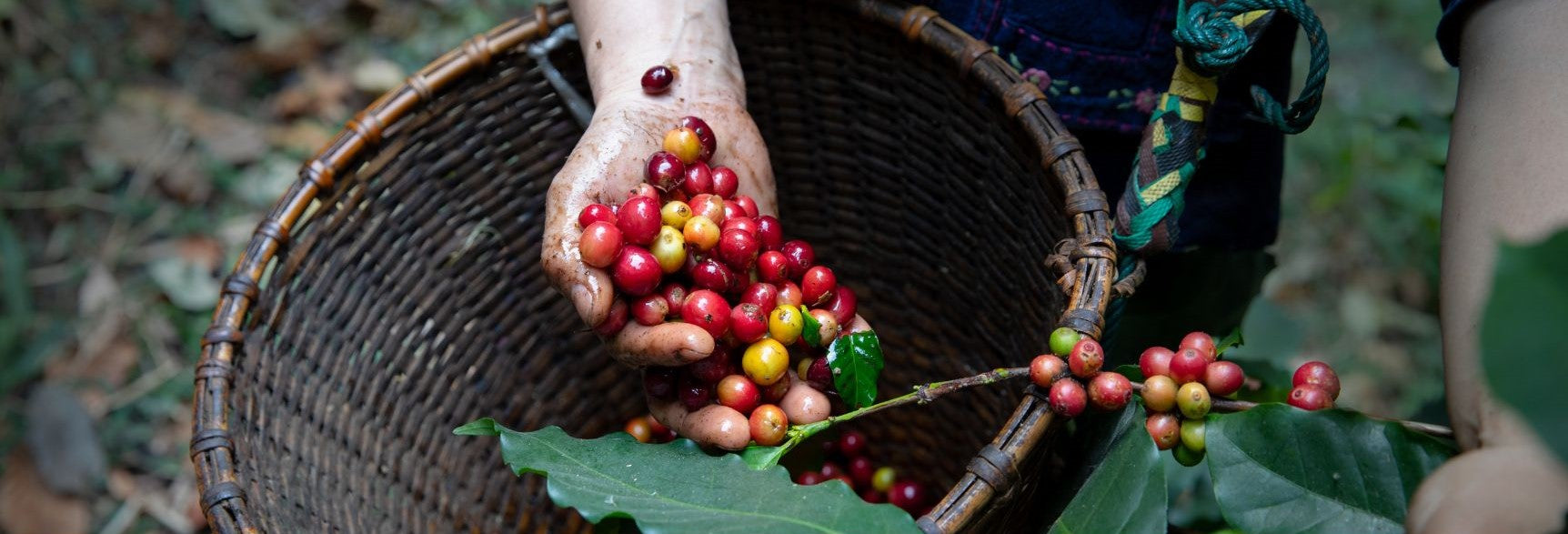Typica
What is Typica?
Typica is one of the oldest and most culturally and genetically important varieties of Arabica coffee, originating from the ancient coffee forests of Ethiopia. It was one of the first species of coffee to be taken from Ethiopia to Yemen, where coffee plants were first cultivated. From there, it spread to India and Java, becoming its own species isolated from the Ethiopian heirloom coffee plants. Today, Typica is a parent plant for a huge mixture of speciality Arabica coffee varieties.
Why is Typica coffee historically important?
In 1706, a single coffee plant was brought from Java to Amsterdam and was placed in the botanical gardens. This one plant played a crucial role in the global distribution of coffee. In 1714, an offspring plant was gifted to the French King, Louis XIV. In 1719, plants were sent from Amsterdam through colonial trading routes to Dutch Guiana, now known as Suriname, located in the north of South America. From there, coffee spread to northern Brazil in 1727 and later to the south in 1760-1770 before it made its way to Peru and Paraguay.
In 1723, the French started sending their coffee seeds to Martinique in the West Indies through their own colonial routes. After that, the seeds were sent to the Dominican Republic, Cuba, Central America (Costa Rica, El Salvador), and Colombia. Until the 1940s, Typica was the most commonly grown coffee plant on the coffee plantations in Central and South America. Amazingly, all of them were descendants of the original coffee plant from the botanical garden in Amsterdam.
What are the different varieties of typica coffee?
Typica is a classic variety of Arabica coffee that has given rise to numerous sub-varieties and mutations over time. Some of the different varieties of Typica coffee include:
- Bourbon: Bourbon is a natural mutation of Typica that originated on the island of Bourbon (now Réunion) in the Indian Ocean (you can read more about its origins here). It is known for its exceptional cup quality, often featuring vibrant acidity, fruity sweetness, and a smooth, creamy body.
- Caturra: Caturra is a mutation of Bourbon that originated in Brazil. It is characterised by its compact size and higher yield than Typica and Bourbon. Caturra is prized for its balanced flavour profile, with chocolate, caramel, and stone fruit notes.
- Mundo Novo: Mundo Novo is a hybrid between Typica and Bourbon that was developed in Brazil. It combines the favourable attributes of both parent varieties, including high productivity, disease resistance, and excellent cup quality. Mundo Novo coffees often exhibit a balanced flavour profile with chocolatey sweetness and citrus acidity.
- Catuai: A cross between highly productive Mundo Novo and compact Caturra, made by the Instituto Agronomico (IAC) of Sao Paulo State in Campinas, Brazil. The plant is highly productive because of its small size.
- Pacamara: This variety originated from a cross between Pacas and Maragogipe. It is capable of producing exceptional cup quality. However, it is highly susceptible to coffee leaf rust and plants not being stable from generation to generation.
What Are the Ideal Growing Conditions for Typica Coffee?
Like all coffee, Typica thrives in specific growing conditions, contributing to its flavour development and overall health. Here are the ideal growing conditions for Typica:
- Altitude: Typica coffee plants typically thrive at higher elevations, ranging from 1,200 to 1,800 meters (3,900 to 5,900 feet) above sea level. Higher altitudes provide cooler temperatures, which slow down the maturation process of the coffee cherries and contribute to the development of more complex flavour profiles.
- Climate: Typica coffee plants require a good balance of sunlight and shade, with temperatures ranging from 15°C to 25°C (59°F to 77°F) throughout the year. Adequate rainfall, typically between 1,500 to 2,500 millimetres annually, is essential for healthy plant growth and fruit development.
- Soil: Typica coffee plants thrive in well-drained, fertile soils with a pH level between 6.0 and 6.5. Soil composition is crucial in providing essential nutrients to the coffee plants, promoting healthy root development, and ensuring optimal fruit production.
- Shade: Typica coffee plants benefit from partial shade provided by taller trees or shade structures. Shade helps regulate temperature, reduce evaporation, and protect the coffee plants from excessive sunlight, which can lead to stress and sunburn.
In summary, the ideal growing conditions for Typica coffee include high altitudes, moderate temperatures, consistent rainfall, well-drained soil, and partial shade. These conditions contribute to the development of high-quality coffee beans with complex flavour profiles and desirable characteristics.
Do Any FiXX Blends Use Typica?
Yes! Typica is used in our multi-award-winning FiXX Classic, Cubano and Organic blends.
- FiXX Classic: Our distinctive multi-award-winning blend of Sumatran, Ethiopian, and Brazilian coffee beans. It produces a reliable, full-flavoured brew that balances smooth, creamy notes with sweet nuttiness and a gentle spice finish.
- FiXX Cubano: Our multi-award-winning signature blend of Brazilian and rare Cuban coffee beans. Its big, exotic, boastful aromas lead to a smooth cup with pleasing vanilla sweetness and subtle smokiness.
- FiXX Organic: Our multi-award-winning exclusive blend of certified organic Peruvian coffee beans, FiXX Organic, is characterised by elegant notes of sweet vanilla and chocolate. It delivers exquisite smoothness and a gratifying aroma.





